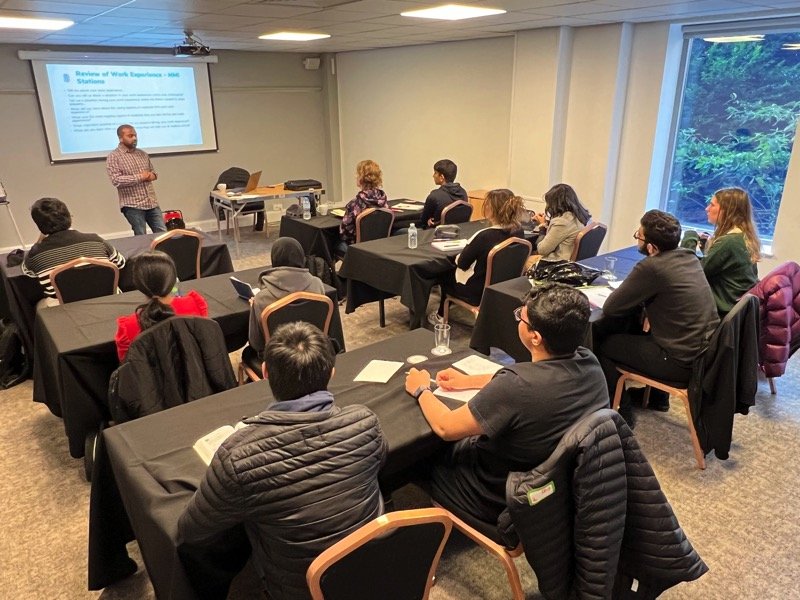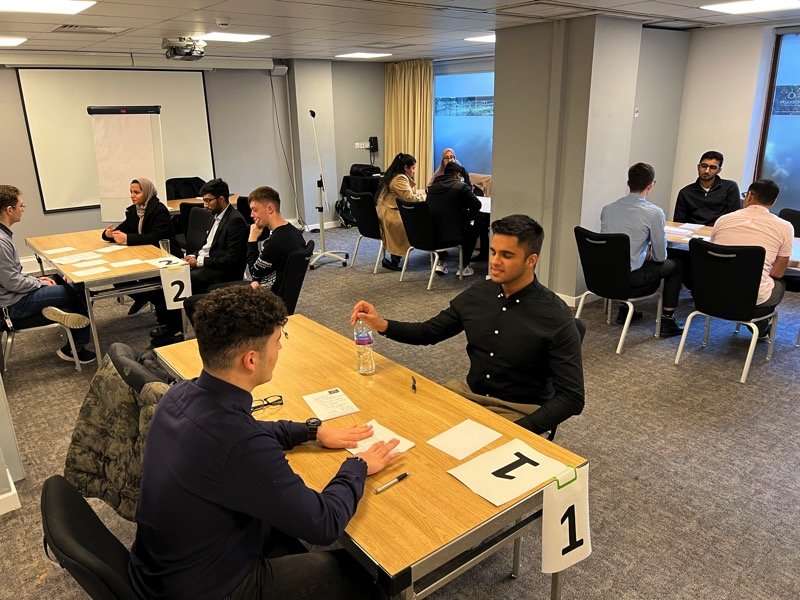20 Medical School Interview Tips
We have now completed several Medical School Interview Courses for 2022 entry as well as our 40 day MMI Mock Interview days. During these we provide specific feedback to the individual students, but I can share with you some feedback as a cohort.
About half of our students have now been called for an interview, usually at one university. Do not be disheartened if you have not heard from any medical school yet as we are still very early in the interview season.
It is normal to have some anxiety when undertaking your interview. However, it was clear from some students that this anxiety was adversely affecting their performance. It may be beneficial for some students affected by this to learn more on how to control their anxiety, for example by keeping hydrated and breathing exercises.
Students are reporting they are using textbooks in their preparation. Reading books may give you a good foundation on which to build your preparation for interviews. Some of the books that students have reported reading are going back to 2013, so you must ensure that any resources that you use are not outdated.
Students are still attending interviews with the only preparation reading an interview book and then only a week before the actual interview. I cannot stress enough the importance of timely preparation and practice.
📚 Medical School Interviews cannot be prepared solely from a book. You need to put into practice the theory that you learn to real world scenarios
Students did attend our MMI circuit days dressed in bright T-shirts and trainers, despite our guidance to the contrary. Do not do this in the real interview. Do not give the examiners an excuse to instinctively mark you down.
When answering questions with examples from your work experience, show the examiners what you have learnt and how it will help you once you are a medical student or a doctor.
If you are unsure about the question, ask the examiner to clarify. If you are stuck on a question, the examiners (at your stage) should give you some help at the expense of losing some marks. If you need time to gather your thoughts, indicate this to the examiner rather than causing an uncomfortable pause in your answer.
Many students were losing focus on the actual interview questions, especially towards the end of the station. It is important to remain focused on answering the question and not waste time by beating about the bush.
There are students who are by nature reticent. These students should not try to come across as confident by raising their voice or sounding unnatural. This was picked up by the examiners.
Some students were running out of time as their speech was too rapid. You should practice timing your answers, for example by recording yourself or getting feedback from parents.
👔 Dress appropriately for your interview. There may not be a mark specific for this but human nature may instinctively mark you down.
Do not assume in questions, for example do not assume patients are competent or their age. Ask for clarification from the examiners.
Remember you are in a medical school interview and the questions will be assessing skills relating to being a doctor. If the question starts with you accidentally running over a pet, do not focus on the damage to your vehicle and car insurance, when the scenario is assessing whether you can show empathy.
Students had problems with questions assessing relating to the duty of candour. Doctors not only need to admit a mistake, but also self-reflect as well as trying to correct any harm done, if this is possible.
Interviewers may be taking notes. You should not be distracted by this and not assume a correlation between how copious the notes appear to be and your performance.
It is important for the student to try and maintain good eye contact with the examiners. You will come across examiners that don’t make eye contact with you and you must not let this distract you. Don’t be distracted by examiners staring at their watch or other erratic movements.
👁 Refer in your answers to any guidance that you have used to make your decisions, for example the General Medical Council, Good Medical Practice.
Ethical questions were generally answered well. It is useful to indicate which ethical principle you are referring to in your answer and how it applies to the specific scenario.
When breaking bad news, many students straight away tell the patient what the bad news is in the first sentence. It is important to prepare the patient (or client) correctly for the bad news.
It is clear some students are not aware of the rules around confidentiality. Students have inadvertently caused a breach of confidentiality in their answers or are unsure of the situations when a breach can be justified.
There is still a social stigma surrounding diseases such as HIV, so it is important to approach questions relating to sensitive topics in the correct manner.
You should never put down any other members of the medical team, for example a nurse or cleaner, even though the examiners may try and lead you to do this.
I hope you found the feedback useful for your interview preparation. We have our last few spaces on our Medical School Interview Courses in 2021. We have our last face to face places in Birmingham, Manchester and London. These all have an option to attend the class from home using webinar.
Keep going! Getting an offer means you can focus on your A-level exams and getting the grades needed to meet those offers, so prepare for your interview adequately.
Click here to learn about our Medical School Interview Course. Taught by fully qualified NHS medical school tutor Dr. Abdul Mannan.
Practice your skills on our 40 Station MMI Mock Circuit Day. As close to the real thing as you get with expert feedback on your performance.


